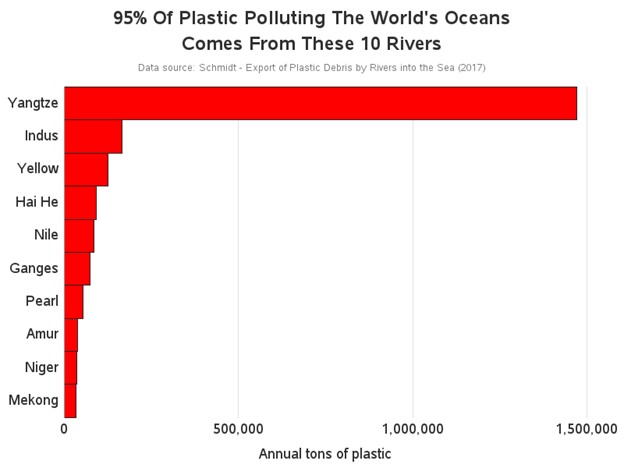Steve Moore’s “Committee to Unleash Prosperity” often shares charts and graphs that graphically illustrate otherwise complex arguments, a simple picture often being worth a thousand words. One especially impressive bar chart calls attention to a thorough study, published in the journal Environmental Science, analyzing plastic debris in the world’s oceans to find out how it got there. It is an eye-opener for anti-plastic crusaders everywhere.
The study was led by Christian Schmidt, a hydrogeologist at the Helmholtz Centre for Environmental Research in Germany and has been cited in over 650 other articles and studies, nearly all of which confirm the findings. Here is the short version – the massive amount of plastic debris floating in the world’s oceans is not dumped from ships but is carried there from ten major rivers. Virtually all of it. The study found that these ten rivers transport up to 95 percent of the global plastic “load” into the oceans. None of them are in the U.S. In fact, statistically speaking, the percentage of the world’s plastic debris found in oceans that comes from the U.S. is precisely zero.

There is a good reason for that. Americans do not throw their trash into the rivers. There may have been a time when that was common practice, but not in our lifetimes. Certainly not since the discovery of appalling islands of plastic in the Pacific Ocean and the growing awareness of their threat to fish and wildlife.
Here is the unvarnished truth we now know, thanks to this and several similar recent studies. Almost all the plastic in the oceans comes from China. Over 1.5 million tons annually is washed into the oceans from the Yangtze, Yellow, Haihe, Pearl, and Amur Rivers, all of them in China. There are also statistically measurable contributions from the Mekong, which originates in China and flows through Laos, Cambodia, and Vietnam, and from two rivers in Africa, the Nile and Niger, and from the Ganges and Indus, both in India. But at 90 percent, it is the Yangtze, the world’s third longest river, that produces almost all the plastic pollution in the oceans.
The Dutch environmental research foundation, Ocean Cleanup, confirmed that conclusion, saying, “10 rivers transport 90 percent of all the plastic that reaches the oceans, the Yangtze River being the biggest polluter by far.” The reason these studies were so groundbreaking and attracted such attention was that China’s rivers had almost never been checked before. Even in 2019, in another Environmental Science journal study, researchers explained that “the exact amount of global riverine plastic emission remains uncertain due to a severe lack of observation. Field-based studies are rare in numbers, focused on rivers in Europe and North America…” Indeed, there were significant studies of plastics in the Rhine, Snake, and Columbia Rivers, the Mediterranean, White, and Baltic Seas, and the Great Lakes.
But when they finally began comparing the research from Europe and North America, they found that “Several waterways in Indonesia and Vietnam contain up to four orders of magnitude more plastic than waterways in Italy, France, and The Netherlands.” And as we now know, no rivers in Indonesia or Vietnam are even close to those in China. The Mekong shows a couple thousand tons a year, compared to over 1.4 million tons in the Yangtze.
There is a simple reason, of course, that rivers in China had not previously been studied for details about plastic pollution – China doesn’t want the world to know. Its government is perfectly comfortable watching America and Europe react to the environmental catastrophe by hamstringing their own economies.
As one of these authors wrote, “Plastic pollution in the marine environment is an urgent global environmental challenge. Land-based plastics, emitted into the ocean through rivers, are believed to be the main source of marine plastic litter.” Perhaps Americans ought to help do something about it. But banning plastic grocery bags in Colorado, as the current Governor and legislature have done (beginning in 2024), will not help. At all.
Not a single grocery bag from Denver or Grand Junction, not a single plastic straw from Boulder or Aspen, have been found floating in any ocean. Activists who are concerned about this issue should focus on China, and the threat it poses to the world’s environment. There is no conservation movement in China, which continues to build giant dams, coal-fired power plants, and factories that pollute the air and water. Such callous disregard for the environment, including throwing plastic into the oceans, is clearly and literally un-American.




Comments on this entry are closed.